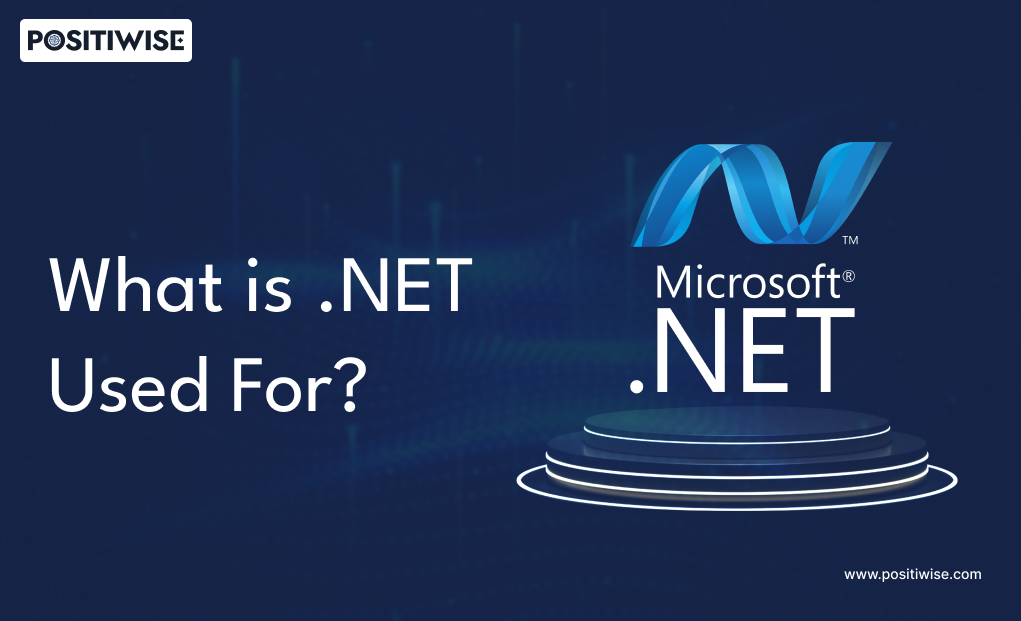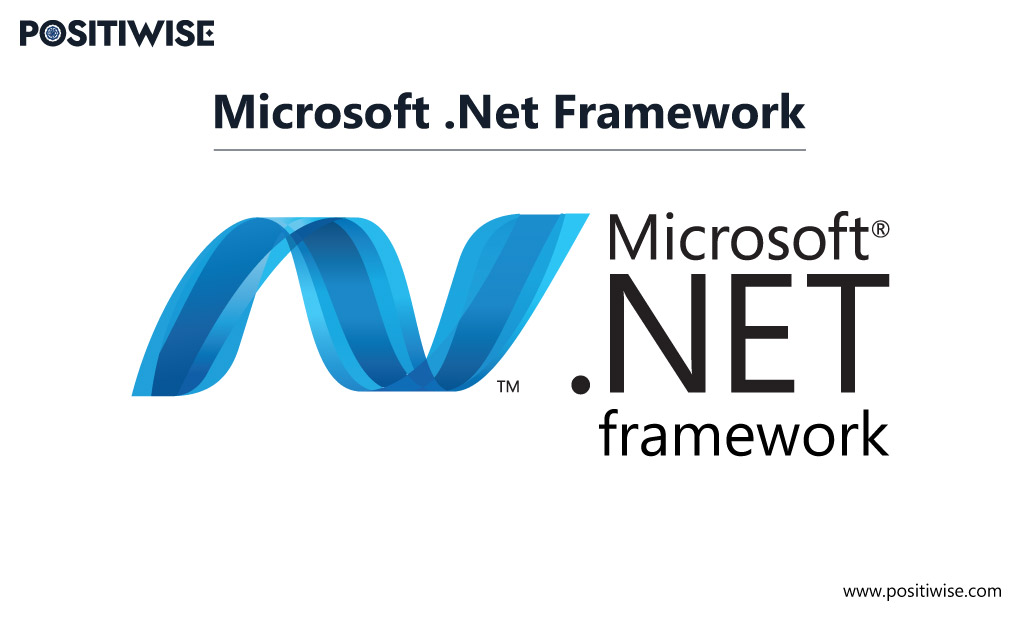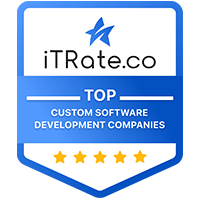Quick Overview:
.NET has been Aladin’s lamp for business owners around the world that came out from the pocket of the industry giant Microsoft on February 13, 2002. With its initial release to date, the .NET framework has seen a number of ups and downs within the market in terms of demands and needs. However, with the evolving tech development marketplace, the framework is destined to grow in the future. In this blog post, we will look at the overall aspects of the .NET framework, and understand what are net applications. We will also explore new horizons of the framework to help business owners understand actually what is .NET used for in 2024.
What is .NET?
.NET is an open-source framework supported by Microsoft that allows for building desktop, mobile, and web apps that can be run on any operating system. The .NET includes several tools libraries and languages that support modern, scalable, and high-performance app development. It maintains a comprehensive developer community that maintains and supports the .NET platform. It is also strongly typed with type safety and has integrated concurrency and automatic memory management.
The .NET framework has come a long way since its initial release in 2002 initially designed for Windows operating systems with version 1.0 to the latest version 4.8.1 released on August 2022.
Features of .NET
The .NET framework is power-packed with a number of breathtaking features that make it a great choice for business owners and new startups worldwide. Let us have a look at a few of it.
- The .NET framework is designed to deliver productivity, performance, security, and reliability.
- The framework possesses automatic memory management via GC or Garbage Collection.
- It is type-safe and memory-safe in nature due to its garbage collection and strict language compilers.
- The .NET offers concurrency via async/await and Task primitives.
- It also has a large set of libraries with broad functionality and has been optimized for performance on multiple operating systems and chip architectures.
When To Use .NET?
.NET is an ideal choice for various applications from various business domains and industries. Here is a list of types of applications that you can develop using the .NET framework based on your specific needs and requirements.
Game Development
.NET allows you to write games for the Unity game engine which is based on Mono again a .NET framework. A few of the popular games that have been developed using the said framework include Inside, Kerbel Space Program, Pokemon Go, Endless Legend, and more.
For creating a game in .NET framework you should write its core in C# and use the libraries of the Mono and Unity platforms. It is also much easier and faster as you don’t have to be proficient in C++. The translation of C# is performed using Mono and Unity.
Web Development
The .NET framework is widely used for creating web applications. The unique feature of web applications is that they need a web browser to function along with a stable internet connection. Every web application whether it is a simple one-page website with images and links or a complex one that requires a lot of time and effort, .NET fulfills all these profiles. A complex web application developed using the .NET development includes the Stack Overflow website, which is the go-to place for every developer these days.
When you write a web application in .NET you need the knowledge of the C# language and the ASP.NET MVC framework. It is also crucial to understand the client or server side, how protocols like REST, HTTP, and JavaScript are designed, and the difference between the front end and the back end. This kind of development is a hard nut to crack and requires a lot of knowledge of web hosting services, domains, plans, and a basic understanding of cloud technologies such as AWS, Google Cloud, MS Azure, and more.
Internet of Things (IoT)
The Internet of Things or IoT is the domain where there is the development of appliances that interact with each other, the external environment, and the Internet. To leverage the Internet of Things you can use the Raspberry PI with Windows 10 IoT Core to control a smart kettle, self-driving cars, home lighting systems, automated dialogue systems, and speech recognition systems that include ready-made frameworks. You can use the NET IoT libraries to leverage to build your IoT systems.
Client Applications
You can refer to the client applications as the products that run on the personal computers and the mobile devices of your end-users. A few of the components of the Windows operating system are developed using the .NET framework which includes the Notepad and the Calculator apps. However, this is not it there are a number of more complex high-level applications that are developed using the .NET framework such as the Tradesignal and the NinjaTrader are a few apps developers using the same.
There are also a few of the client applications for the smartphones. Using the .NET Core and the Xamarin.Forms you can write the said application and publish it in the App Store or Google Play to make them accessible for any smartphone or tablet device.
Enterprise Applications
Enterprise applications are the ones that you can also build using the .NET framework. However, it is not the domain for the end users but for the business owners worldwide. These products include information management systems, document management systems, customer relationship management systems, or CRMs. and more.
The enterprise system is a consolidated version of web, desktop, and mobile development. Though to an extent the enterprise systems are universal but still are destined to solve a specific set of issues and a range of tasks. For an ideal enterprise system development your development team must have significant expertise in C#, .NET, and JavaScript. Your developers should also be familiar with the instruments that a future enterprise product will be based on to get the most out of it.
Other Applications
Leveraging the dot net ecosystem you can also develop and integrate custom machine learning algorithms within your .NET applications. You can utilize the collective efficiency of the framework and create performant applications. For any solution that is not easily available within the domain of the framework, you can find the set of specific function libraries on the public NuGet repository and with that reference, you can create, share, and use numerous dot net libraries for each of your requirements contributing to creating a number of business applications.
Advantages of .NET Framework
When it comes to noting everything down then there is not just one advantage of .NET framework but a huge lot of advantages that make it popular among business owners. Let us have a look at a few of them.
- Comprehensive Community: The .NET framework possesses a huge lot of active community that is readily available for assistance and has created a comprehensive set of resources including libraries, tools, and documentation that your development team can use based on their specific needs and requirements.
- Security: The .NET framework provides you with a huge set of security features such as code access security and digital signatures which can help you protect your applications from malicious attacks.
- Multi-Language Support: The framework also allows support for multiple programming languages such as C#, F#, and Visual Basic which enables your development team to choose the programming language that ideally aligns with your specific business needs and requirements.
- Productivity: The dot net framework also has a set of prebuilt libraries and tools that help your development team save their precious time and efforts and contribute it to improving the efficacy and efficiency of your business applications.
- Cross-Platform Compatibility: The dot net framework allows you the power to run it on multiple platforms such as Windows, Linux, and macOS making it a flexible option when it comes to developing and deploying your applications.
Disadvantages of .NET Framework
As every coin has two sides, the same is the case with the .NET framework. With its huge lot of benefits, it carries certain cons that must be addressed by every business owner before jumping into it. Here is a list of these cons:
- Performance: The dot net framework offers significant performance for a number of applications, however, it may not be the most suited option for high-performance applications that need low-level access to hardware or complex algorithms.
- Learning Curve: The .NET framework is designed to be simple and effective when it comes to developers who are new to the dot net platform or to object-oriented programming. Also, the novice developers who are new to the domain of software development even actually understanding ‘what are net applications’ are complex.
- Licensing: Generally dot net is free to use but a few versions require a license, which leads to additional costs of development and deployment making it a non-economical option for business owners and startups.
- Dependency on Windows: The .NET framework allows running on multiple operating systems, it was originally built for the Windows operating system which again makes it a not-so-good option for cross-platform web application development.
- Large Footprint: The dot net framework possesses a comprehensive installation footprint which makes it complex to deploy applications on systems that have a limited storage or bandwidth.
Looking to Effortlessly Boost Your .NET Project?
Equip your team with exceptional .NET expertise. Bring our skilled .NET Developer on board for your projects now!
When Can You Use .NET Framework?
There are a number of scenarios where dot net web application development is your ideal option however the three most common use cases are as follows:
- Scalable Product Development: When you are a business owner looking to grow their existing legacy applications then .NET offers an effective scalable environment for redesigning the ongoing applications and redeveloping them ideally to match the growing needs of your business. You can also easily scale and upgrade your existing .NET applications.
- Enterprise Scale Development: As a business owner choosing the .NET framework, often creates doubt if .NET is ideal in this scenario, but with Microsoft’s support of comprehensive tools possible for building the cross-integrate enterprise-grade products, .NET passes the arena for both the internal and the public ones. Also, the dot net framework offers support for a robust enterprise mobility ecosystem.
- Cross-Platform App Development: When looking for a business app that runs ideally on multiple platforms, .NET is a great choice as it supports many platforms which reduces your development efforts while helping to expand the horizons of your desktop or mobile applications to other platforms or operating systems. You can also use the .NET for specific engineering cases such as gaming and AR development.
Conclusion
With this, we can conclude that the .NET framework has its own set of use cases where it performs ideally well making it a great choice for business owners across the world. However, if .NET is your go-to choice for your next business application the answer that you can realize by yourself by assessing your specific needs and requirements. However, if you are a business owner looking to choose .NET for your next web app development project then, you should contact a leading .NET Application Development services provider to bring out the best in your business application.
FAQs
Why do I need .NET framework?
You need the .NET framework installed to make sure that you run applications on Windows that were developed using the .NET framework. Though it is already present in many versions of Windows you can download it if prompted or needed.
What are the three significant phases of development in .NET technology?
The three important phases of development in the .NET technology are:
- The OLE Technology or Object Linking and Embedding
- The COM Technology or Common Object Model
- The .NET Technology
Is there any company that still uses the .NET technology?
There are a number of companies such as Dell, TCS, Accenture, HCL, Epic Systems, and more that use .NET for their web application development in 2024.
What are the components of the .NET architecture?
.NET has a modular and optimized architecture and offers three main components that you can use to meet your specific software development requirements. The components are:
- .NET languages
- Application model frameworks
- .NET runtime
What are dot net programming languages?
C#, F#, and Visual Basic are the three main Microsoft-supported languages for NET development. However, different companies and developers have also created languages like Eiffel, ClojureCLR, IronPython, and others that effectively work with the .NET platform.
Expert in Software & Web App Engineering
Parag Mehta, the CEO and Founder of Positiwise Software Pvt Ltd has extensive knowledge of the development niche. He is implementing custom strategies to craft highly-appealing and robust applications for its clients and supporting employees to grow and ace the tasks. He is a consistent learner and always provides the best-in-quality solutions, accelerating productivity.






